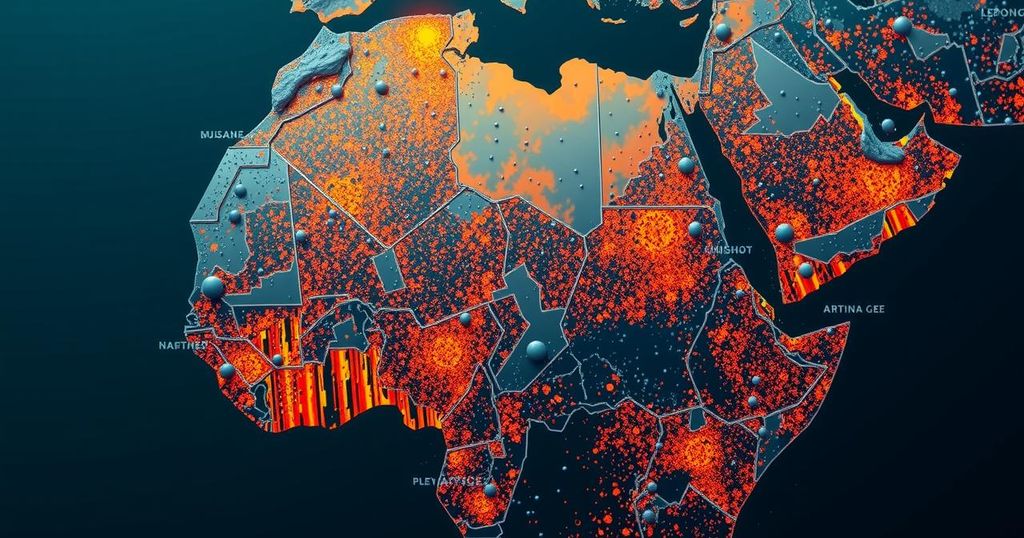A study revealed that anthropogenic climate change has intensified rainfall leading to devastating floods in Sudan, Nigeria, Niger, Cameroon, and Chad, resulting in 2,000 fatalities and millions displaced. The report highlights a 5-20% increase in extreme rainfall intensity attributed to global warming, with predictions of more severe events in the future due to rising temperatures. Urgent investment in infrastructure and early warning systems is essential to prepare for ongoing and future challenges posed by climate change.
A recent study conducted by the World Weather Attribution (WWA) revealed that significant rainfall leading to severe flooding in five African countries—Sudan, Nigeria, Niger, Cameroon, and Chad—can be attributed to anthropogenic climate change. Released on October 23, 2024, the report states that global warming has intensified the extreme rainfall experienced this rainy season by approximately five to twenty percent across the Niger and Lake Chad regions. This year alone has witnessed devastating floods that claimed the lives of about 2,000 individuals and displaced millions, as reported by the United Nations Office for the Coordination of Humanitarian Affairs (OCHA). The analysis indicates that occurrences of prolonged intense rainfall in certain areas of Sudan have surged by roughly 18 percent over the previous forty years attributable, at least in part, to climate change. With the continuous impact of human-induced climate change, such severe rainfall events are becoming more frequent and are anticipated to increase with further global temperature rises. In a future where global temperatures could rise by 2°C or more, experts predict that even heavier rainfall will reward the region, necessitating preparedness for increasingly impactful weather events. The ramifications of these floods are deeply intertwined with various challenges, including ongoing conflicts, widespread displacement, crumbling public health systems, acute food insecurity, and a worsening cost of living crisis. Vulnerable communities faced with these challenges are particularly at risk, especially given many internally displaced persons (IDPs) have severely limited access to essential services, rendering them more susceptible to flooding. In West and Central Africa, floods have wreaked havoc on critical infrastructure, contributing to the escalation of waterborne diseases, with cholera alone accounting for over 350 casualties in Nigeria this year. The WWA analysis underscores the reinforcing cycle of persistent conflicts and fragility, which magnify the risks associated with these extreme weather events. The study further emphasizes the urgent need for enhanced infrastructure maintenance, particularly the upkeep of dams, and the importance of investing in early warning systems to bolster preparedness and response. The troubling events of 2024 in Sudan have further highlighted the pressing challenges surrounding water governance and adaptation, particularly in relation to shared water resources.
The increasing frequency and intensity of extreme weather patterns, such as the heavy rainfall leading to flooding in various parts of Africa, have been increasingly linked to human-induced climate change. This phenomenon disproportionately affects vulnerable populations in regions already facing challenges such as conflict, poverty, and infrastructure decay. With global temperatures rising, researchers are warning that such severe weather events are likely to become more common, requiring urgent action to adapt and mitigate their impacts. The World Weather Attribution initiative serves to analyze these events scientifically, providing vital information that can aid policymakers and humanitarian organizations in addressing the needs of affected communities.
In conclusion, the recent catastrophic flooding in five African nations has starkly illustrated the profound effects of climate change on weather patterns, leading to extreme rainfall that has devastating consequences for vulnerable populations. The findings of the WWA study underscore the necessity for immediate and strategic investment in infrastructure and early warning systems to mitigate the impacts of such events in the future. As global warming continues, the risks associated with extreme weather will compound existing crises in public health, food security, and social stability, illustrating the critical need for a coordinated and proactive approach to climate adaptation and disaster risk management.
Original Source: www.downtoearth.org.in






